
Related
Guests
- Hani Almadhoundirector of philanthropy at UNRWA USA. He’s the co-founder of the Gaza Soup Kitchen with his brother Mahmoud Almadhoun, who was killed in an Israeli drone strike in Gaza on Saturday morning. Mahmoud Almadhoun is survived by seven children, the youngest just a newborn.
Israel killed more than 200 Palestinians in Gaza on Saturday, including 40 members of a single family. The official death toll in Gaza is now over 44,000, although experts believe that is a vast undercount of the true figure. Israel’s onslaught has continued to kill medical and aid workers in recent days, including three people with World Central Kitchen, the head of the intensive care unit at Kamal Adwan Hospital, a staff member with Save the Children, as well as Mahmoud Almadhoun, who co-founded the Gaza Soup Kitchen that has fed Palestinians suffering hunger due to Israel’s blockade of vital food aid. Almadhoun was killed in an Israeli drone strike and is survived by seven children, including a newborn baby. His brother Hani Almadhoun joins Democracy Now! to discuss what he calls a targeted assassination. “My brother slowed down the ethnic cleansing of north Gaza, and that’s why he was taken out,” says Almadhoun. “This is a war against the civilians in Palestine.”
Transcript
AMY GOODMAN: This is Democracy Now!, democracynow.org, The War and Peace Report. I’m Amy Goodman.
We turn now to Gaza. On Saturday, Israel killed more than 200 Palestinians in Gaza, including 40 members of a single family. In recent days, Israel killed three aid workers with [World Central] Kitchen, the head of the intensive care unit at Kamal Adwan Hospital, a staff member with Save the Children, as well as Mahmoud Almadhoun, who co-founded the Gaza Soup Kitchen that’s fed Palestinians facing hunger due to Israel’s blockade of vital food aid. Almadhoun was killed in an Israeli drone strike. He’s survived by seven children, the youngest just a newborn.
We’re joined right now in Washington, D.C., by Mahmoud Almadhoun’s brother, Hani Almadhoun. He works as the director of philanthropy at UNRWA USA. He co-founded the Gaza Soup Kitchen with his brother.
Thanks so much for being with us, Hani. Our deepest condolences on the loss of your brother, following the loss of your other brother last year in Gaza. Can you tell us about your brother and what happened this weekend?
HANI ALMADHOUN: Thank you, Amy.
My brother Mahmoud was targeted and assassinated in the morning of Saturday at 9 a.m. He left the house, walked about 30 yards, and a drone was waiting for him and just launched its rocket, killing him on the spot. He was headed to Kamal Adwan Hospital, where for the past three or four weeks he’s been supporting the hospital with food, delivering food for them, delivering produce from other parts of Gaza, and, you know, even blankets. Everything he had, he gave it to the hospital when he felt the bombs were falling nearby and he could no longer cook for them.
He was targeted. When the folks who tried to rescue him, or they thought they could save his life, they tried to take into the hospital, sniper fire fired at them. So they tried again. They were shot at. So, they decided, by then, it was too late. They wrapped him in a blanket, took him home, said final goodbye and buried him in a makeshift grave.
And this is my brother, the humanitarian, the father of seven, the youngest who still does not have a name because there is no office in Gaza to give people names or birth certificates. He was debating — the last argument he had was either to name her Aline or Kawthar. And now she will grow without a dad.
He is my partner. He is my buddy. He’s my young brother, who closed every video he’s ever sent me, “I send this with greetings and appreciation to my friends in the United States of America,” despite the fact that the bombs killed our brother Majed, American bombs. Every video he would send, he would say, “For my friends in the United States of America.” And now he was assassinated, and the target was him. There was nobody else. He is a full-time civilian.
In fact, we miss him dearly, and we’re still processing this, but I worry for his seven kids. The oldest one is Omar, who was targeted four days before the killing of my brother, and he is already receiving medical attention. So, you can imagine having to break the news to a kid who’s 14 years old, telling him that his dad has been killed and now he is the family provider. It’s overwhelming, Amy.
And sadly, my brother is no longer here. We continue to pray for him and tell people, you know, we are still there at the Gaza Soup Kitchen. We’re not closing shop, not because we want to make a statement, but because we want to make sure our families have food to eat. This is hunger and famine, both in north Gaza and south of Gaza. My brother slowed down the ethnic cleansing of north Gaza, and that’s why he was taken out.
AMY GOODMAN: You mentioned that at the end of every letter he would offer a shoutout to the people of the United States, despite the fact that it was the Israeli military which is armed by the United States that killed another of your brothers. Can you explain what happened last year, Hani?
HANI ALMADHOUN: So, last Black Friday, about November 24th, an American airplane — I believe it was F-16 — dropped a big bomb on our family’s house, killing my brother Majed, his wife Safa, his daughters Riman, Siwar, Omar and Ali, the youngest of him 7 years old. And it’s unfortunate because he’s also a shopkeeper. He did not deserve to be killed using American weapons. It took us a week to recover their bodies. And we just observed the salam, or anniversary, of their killing by Israel.
And now, just a day after that, a couple of days after the anniversary of their killing, we observe the killing of our brother Mahmoud. This was so shocking, because Mahmoud has been — he’s not a nameless and faceless Palestinian like a lot of our family members are. He’s been — established a profile. He’s written an op-ed to The Washington Post. He was on NBC, talked about the work, and people know him. He just solves problems. He started a medical point that was saving lives when Kamal Adwan Hospital was sieged and people could not go. His medical point will really provide lifesaving care. He started a school. It operated for two months. And he put the U.S. flag on the school, and in Hebrew it says, “Please do not bomb,” and it was also bombed. So, even the Israeli press is asking the army what happened there. There was nobody inside that school. They still bombed it. And actually, they hit where it says “do not bomb” next to the American flag, and the sign disappeared because of the explosion. And few days later, they take out Mahmoud, our brother.
And it’s sad, because this is a policy supported by a progressive president, unfortunately. This is — you know, I work and I support the amazing work of UNRWA. As you know, they’re trying to ban UNRWA. And now they’re not only banning UNRWA, the largest humanitarian actor inside Gaza, they’re also going after small shops like our family’s soup kitchen that provided meals for 600 families, found out a way to deliver produce to the hospital. And we believe that’s why he was targeted, because Kamal Adwan Hospital, they wanted to have it lifeless and people leave the north, and Mahmoud delayed that because he delivered flour and canned goods and diapers and baby formula. This is no longer about killing any Palestinian who’s hurting the Israelis. This became about killing any Palestinian who’s helping the Palestinians, like my brother, like the other chefs who were killed in the south.
But this is tragic. We’re not going to be intimidated. Obviously, we grieve for our brother. He’s a good guy, and, you know, we have to take responsibility for his kids and make sure they’re taken care of. But also we’re going to make sure we do this as long as we’re able to, because his memory, that’s what he wanted us to do. And we continue this legacy. That’s why I’m talking to you here.
And this is why I want to make sure people know that real families that we know, that love this country very dearly, are also getting targeted. This is no accident. And they have nothing on my brother, Amy. I feel sorry saying this, but in December, the Israeli army abducts any man in the north. They would release them after 24 hours, after they check their records. Twice, the Israelis abducted him, like the hundreds of Palestinians, and they would release him after 24 hours. That tells you they have no interest in him, but they targeted him because of the humanitarian and lifesaving work in north Gaza.
AMY GOODMAN: I want to ask you further, Hani, about what’s happened at Kamal Adwan Hospital. Dr. Ahmed al-Kahlout, the director of the hospital’s intensive care unit, was also killed this weekend. If you could comment on what happened to him? And he was killed by an Israeli drone. Your brother, who was known as Chef Mahmoud Almadhoun, knew him very well. In fact, Dr. al-Kahlout had just asked him to help him find some tomato paste? I want to, before you answer, turn to Dr. Ahmed al-Kahlout speaking to Al Jazeera before he was killed.
DR. AHMED AL-KAHLOUT: [translated] The explosions shot shrapnel that can break bones. Israeli forces destroyed the water tanks and sewage system for the 10th time. That’s a real problem for the functioning of the hospital. The situation is very dire.
AMY GOODMAN: That’s Dr. Ahmed al-Kahlout, who was killed this weekend, head of Kamal Adwan’s intensive care unit. Hani?
HANI ALMADHOUN: Yes, rest in peace, Dr. Ahmed al-Kahlout. He’s a friend of the family. He’s our neighbor. He was killed exactly a day before Mahmoud. In fact, he gave my — he was able to give my brother painkillers, because my dad, who’s 72 years old, was hurt two weeks ago by Israeli quadcopter, and we couldn’t find painkillers. The doctor said he didn’t want anything. He asked if Mahmoud can do him a favor and get him tomato paste. Can you imagine this hero saving lives and can’t find tomato paste? And Mahmoud said, “I’ll find it for you.” And he went to the hospital, and boom, that day, the guy was assassinated. He’s the head of the intensive care unit.
Mahmoud has developed a friendship with Dr. Hussam Abu Safiya, the hero doctor, solving problems for him. In fact, 10 days before Mahmoud’s assassination, he delivered filtered water for the hospital for their dialysis unit. Can you imagine a civilian figuring out how to deliver filtered water for the hospital, not just for drinking, but also to run the dialysis unit? You can’t imagine how important Mahmoud was for the hospital. The hospital already sent their condolences. They’re worried about lack of his support. In fact, yesterday the shipment of produce that Mahmoud ordered just got to the hospital. You know, they are out of fresh food. They’re eating pasta and rice that’s delivered by UNRWA and the World Health Organization.
But yesterday I was in a conference call with Dr. Hussam, and he said, “Out of the 50 items we need, these organizations are able to deliver six or seven,” and he’s frustrated because he’s not getting the help he needs. And, you know, I’ve met the doctors. They’re not seasoned by any measure. They’re just fresh out of medical school, trying their best, doing things that — even nurses in Gaza are doing operations now, because there’s nobody else to do these things. And it’s unfortunate we continue to do this.
And the cruelty, Amy, my brother survived this genocide for 420 days, and then he’s killed. And he was telling me the day before, “Hani, there might be good news. They’re talking about a ceasefire.” It’s one thing to be killed early in the war and not suffer as much, but he was killed toward, I hope, to be the tail end of it.
He does not deserve to be killed. And I inquire and I challenge the Israelis to publicly say why they targeted my brother. We have full confidence that he is the person we know. He’s a civilian dad who wanted to help his neighbors, and everybody knows him and supported him, and we pray for him.
But also, we want to make sure people there, you know, they can still do things. You know, why are they banning UNRWA? Why is the U.S. defunding the U.N. agency? This is no longer about October 7th and the horrors. This is about ethnically cleansing north of Gaza. The south is also facing starvations. We run a soup kitchen there. And we went from a $1,000 budget to $5,000 daily budget just to get people some rice, because food is not available. But we want to respond. Despite our pain, my cousins and nephews and sister-in-law is cooking for people in four out of the five soup kitchens we continue to run. We’re not going to close, because this is our family, this is our commitment. We don’t cook for people, we don’t eat ourselves.
This is not — and this is risky. You know, it should not be risky. It should not be an heroic act to get water to the hospital. And that’s why I remember the 230 UNRWA staff who were killed, and not just UNRWA. You’ve mentioned the Save the Children. You’ve mentioned other organizations who have lost their staff. And —
AMY GOODMAN: World Central Kitchen.
HANI ALMADHOUN: Yes, correct. And unfortunately that sometimes, you know, Israeli accusations run in the media as a fact, and that’s — nobody challenges whatever allegations are made, because, “OK, it’s good enough for me.” Nobody’s going to push back. And in the case of my brother, we’re pushing back as much as we can.
AMY GOODMAN: Finally, of course, you are not the only one who’s accusing Israel of ethnic cleansing. Israel’s former Defense Minister Moshe Ya’alon has accused Israel of ethnic cleansing and committing war crimes in Gaza. He served as Netanyahu’s defense minister from 2013 to '16, made the accusations several times over television, including on one of Israel's biggest TV channels. This is what he said, and we’re going to end with your comment after this.
MOSHE YA’ALON: [translated] To occupy, to annex, to cleanse, ethnic cleansing, look at the northern Gaza Strip and settle a Jewish settlement. That’s the point. … There is no Beit Lahia. There is no Beit Hanoun. They are operating in Jabaliya and are essentially clearing the area of Arabs.
AMY GOODMAN: That’s Israel’s former Defense Minister Moshe Ya’alon. Your final comments, Hani?
HANI ALMADHOUN: This is our reality. This is the horrors my family faced. We’ve lost our brother last November. He is a full-time civilian, and they killed our brother. This is the price to pay for standing where we were raised. This is the memory of the Nakba. We learned our lesson from our grandparents who were ethnically cleansed. And now we refuse to do the same. But unfortunately, when they kill so many of our family members, our family relocated still in north Gaza, standing by, hoping that somebody watching, somebody listening, somebody from our government will definitely develop a conscience and try to save our people. This is no longer a war against terror. This is a war against the civilians in Palestine, including Gaza. Thank you so much.
AMY GOODMAN: Hani Almadhoun, again, our deepest condolences. Hani is director of philanthropy at UNRWA USA, co-founder of the Gaza Soup Kitchen with his brother, Chef Mahmoud Almadhoun. He was killed in an Israeli drone strike in Gaza on Saturday morning.
Coming up, we look at the surprise rebel offensive to retake the Syrian city of Aleppo. Back in 20 seconds.
[break]
AMY GOODMAN: “Joy” by Circulatory System. Musician and artist Will Cullen Hart passed away this Friday of natural causes.

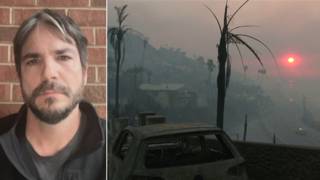
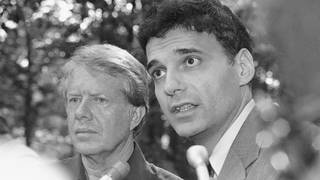
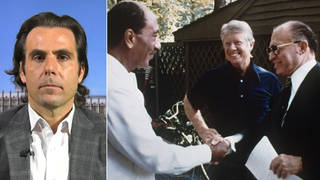
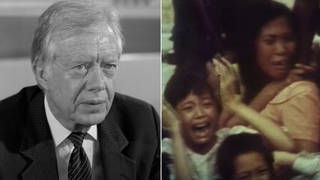





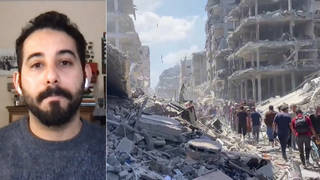
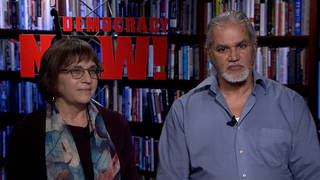
Media Options